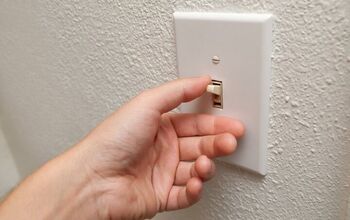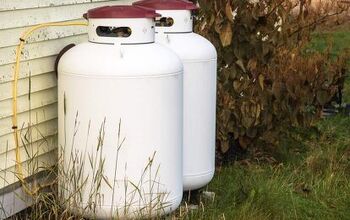Why Your Gutters Are Overflowing & How To Fix It Fast

Your gutters are crucial. They help keep water off your roof and away from the side of your house. But what happens when your gutters start overflowing? Is there a way to fix them fast? Here’s your answer.
You can fix overflowing gutters quickly. First, make sure the line is balanced. Then, clean out the system to ensure efficient water flow. Afterward, check for holes and damages. And if that doesn’t work, consider installing new gutters, flashing, and facia.
Do You Need Your Gutters or Downspouts Cleaned?
Get free, zero-commitment quotes from pro contractors near you.

Why Do My Gutters Keep Overflowing?
There might be several things causing your gutters to overflow. However, the most common problem is a blockage in the downpipe. Jams can make water back up into the system and spill over the sides. And if the water in your lines isn’t moving correctly, it could spell trouble.
Your gutters keep getting clogged because of leaves, birds, and debris. But it’s impossible to stop those things from getting inside your pipes. So, many homeowners install gutter guards to keep blockages at bay. It’s certainly an investment with pros and cons. But gutter guards can help prolong the life of your drainage system and protect your home.
Overflowing gutters can also become heavy and start to shift. Over time, standing water in your gutters might even unbalance the entire system. Then, you’ll have to pay for realignment and repairs to fix it. And in some cases, you might have to replace the whole thing.
Should Gutters Overflow in Heavy Rain?
Where you live can play a significant role in your gutters’ effectiveness. For example, people who live in areas with lots of rain might have to repair or replace their systems often. Meanwhile, people who live in arid climates can use the same drainage lines for many years. Regardless, your gutters shouldn’t overflow at any point unless there’s an obstruction.
Your home’s gutters aren’t supposed to fill up with water at all. Plus, you’re not supposed to let standing water collect in your gutters either. So, even in heavy rain, your pipes can still wick away moisture. If they don’t, you should have them inspected.
NOTE: Gutter system inspections aren’t expensive, and you can do most of it yourself.
Why Are My Gutters Not Draining?
Your gutters aren’t draining because of one of many reasons. And it’s up to you to figure it out before hiring a professional. So, some of the most common causes of gutter clogs are as follows:
- You have too much debris collected in the lines.
- Animals and pests have created homes inside your system.
- There’s a leak somewhere in the pipes.
- Your gutters are too small to handle the rainfall in your area.
If your gutters are too short or narrow, they can become jammed with debris more efficiently. And if birds or pests make nests inside, you won’t be able to access the clog without disturbing them. That means you have to check first and then call animal control if the wildlife doesn’t leave.
Furthermore, don’t forget to check for leaks. You might think that leaks will help keep water from collecting in your gutters. But that’s not always the case. Your gutter system relies on water pressure to flush the lines. And leaky pipes can reduce that pressure, causing your lines to clog more quickly.
TIP: Check your drainage system for damage every year, especially if you live in a wet climate or have a pest control problem.
Why Is Water Dripping Between Gutter and Facia?
If water is dripping between your gutter and facia, it’s probably because you installed the system without adequate flashing. In most cases, your flashing covers the back of your pipes to prevent water leakage. But if you don’t hang it correctly, droplets can slip down the side of your house.
You might also consider installing a gutter apron. That’s because gutter aprons create an additional barrier between your roof and the rain. You can tuck a piece of bent flashing under your shingles to create a makeshift design. However, it’s best to have your aprons professionally installed.
DID YOU KNOW: Homes with professionally installed gutter aprons typically sell for more money because they’re better protected.
How Do I Stop My Gutters from Overflowing?
There are several ways to stop your gutters from overflowing with water. But some of the following methods aren’t effective if you only do them once. Preventative maintenance is crucial, and it can help save you some money as well. Think: cleaning leaves out of your gutters each spring.
Act fast if you notice that your gutters collect water or spill over the sides. Heavy or clogged drainage systems can cause a snowball effect at your house. So, try these five suggestions when you’re ready:
#1. Clean Up Your Downspouts
Remove any leftover debris that could flow through the pipes and cause a jam. But keep in mind that cleaning out gutters can be dangerous. So, proceed with caution, use safety equipment, and ask for help if you need it.
#2. Buy Some Gutter Guards
There are advantages and disadvantages to using gutter guards. However, guarded gutters don’t fill up with debris as quickly as unprotected pipes. And pests generally stay away. But always find out your options first because some insurance companies don’t like gutter guards.
#3. Install Splash Guards
Splash guards help prevent water from spilling down the side of your house during heavy rains. So, they’re practical for homes in moist climates. Plus, a splash guard can also keep pests from nesting in your lines. So, weigh the pros and cons carefully.
#4. Try Using Bigger Gutters
If you buy bigger pipes and wider downspouts, your system won’t get jammed so easily. More space allows for better water flow. And better water flow creates momentum inside your system. That means oversized gutters get clogged a lot less.
#5. Check the Pitch and Tilt
The pitch and tilt of your gutters are more important than you think. That’s because channels with the wrong angle or tilt can create stagnant pockets of standing water. And if that happens, your entire system could break.
How Do You Fix Gutter Pitch?
Fixing gutter pitch is easy. First, unscrew the brackets that secure your gutters to the house, and then throw them away. You’ll need brand-new brackets for this project because the old ones can snap. Now, drive some screws through your new bracket to hold it in place.
Next, pull down on the edge of your gutter pipe. This helps create the correct pitch for your downspout. Afterward, secure the position with more screws and brackets. And be sure to check the condition of all the connected pieces.
For more help, reach out to a professional gutter installer. After all, your utter edges can be sharp. So, prevent injuries with due diligence.
Unclog Your Gutters
Your gutter system has to work overtime when there’s too much debris in the lines. And that means you have to clear the channels often. But if you see standing water or watch it overflow, act quickly. Your entire sequence could be in disrepair.
Do You Need Your Gutters or Downspouts Cleaned?
Get free, zero-commitment quotes from pro contractors near you.

Related Questions
How Do You Balance Gutters?
Gutters that sag or slope can be dangerous. And they can fall at any time. That means you have to check the brackets and keep each pipe balanced. Fortunately, it seems like that’s the easier route.First, tighten screws with a screwdriver. Make sure you don’t strip the screw, or else that portion of the pipe might droop. And if your lines bend out of shape, try to straighten them immediately. Meanwhile, don’t be afraid to hire professionals when you need them.
No, it’s not normal for gutter channels to hold onto water. They’re supposed to wash rain away from your roof and walls. So, gutters with standing water are a sign of trouble. Try to fix the problem as soon as you can.
Can Clogged Gutters Cause Leaks?Clogged gutters can be a hassle. And that’s especially true if they cause leaks. But because water leaks can damage your home, it’s crucial to keep the lines cleared of debris. Furthermore, jams in the system can be heavy depending on what’s causing them. And heavy channels can make your pipes sag.
What Damage Can Overflowing Gutters Cause?Overflowing gutters aren’t good. They can cause significant damage to your property. Plus, it’s easier to fix clogged drains than fixing a dilapidated exterior wall. So, pay close attention to the condition of your system and repair damages as quickly as possible.
Clogged gutters can rot your facia. When that happens, water could enter your home. You might see ceiling damage or problems around windows and woodwork as a result. And if the problem persists, you could compromise the integrity of your house.
Related Guides
How To Clean Gutters Without A Ladder (5 Ways To Do It!)
Guide To Gutter And House Drainage Distances: 7 Useful Options

Tiffany Nichols specializes in aesthetics, design, marketing, and manufacturing. She's a copywriter and editor for several home renovation companies in the U.S. and works alongside some of the biggest names in the industry. Her hobbies include architecture, art, mental health, and fashion.
More by Tiffany Nichols



























